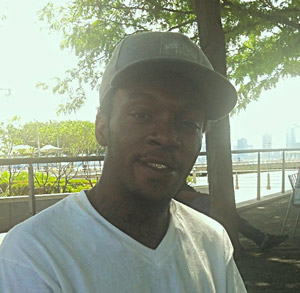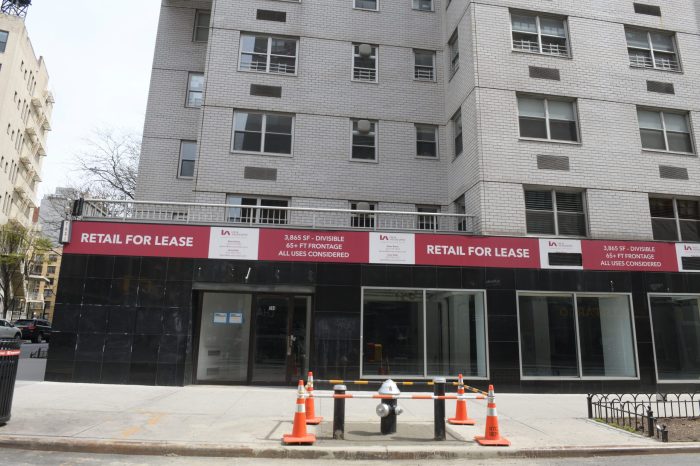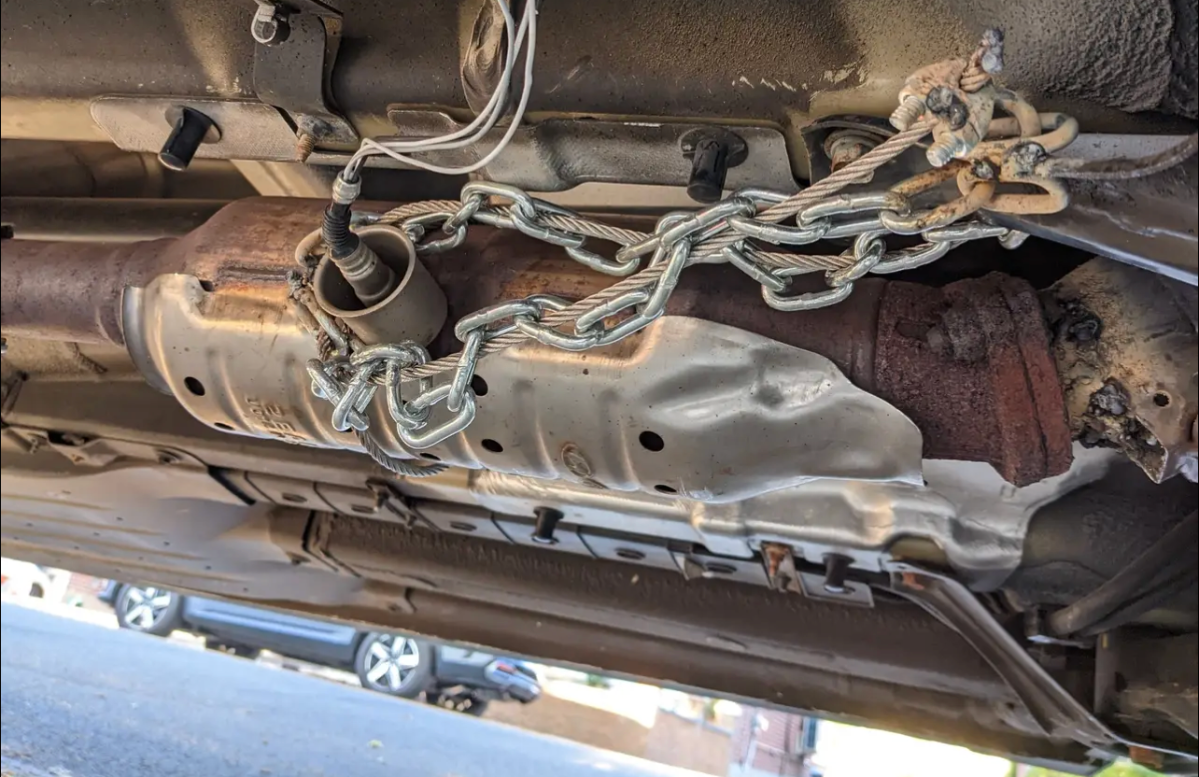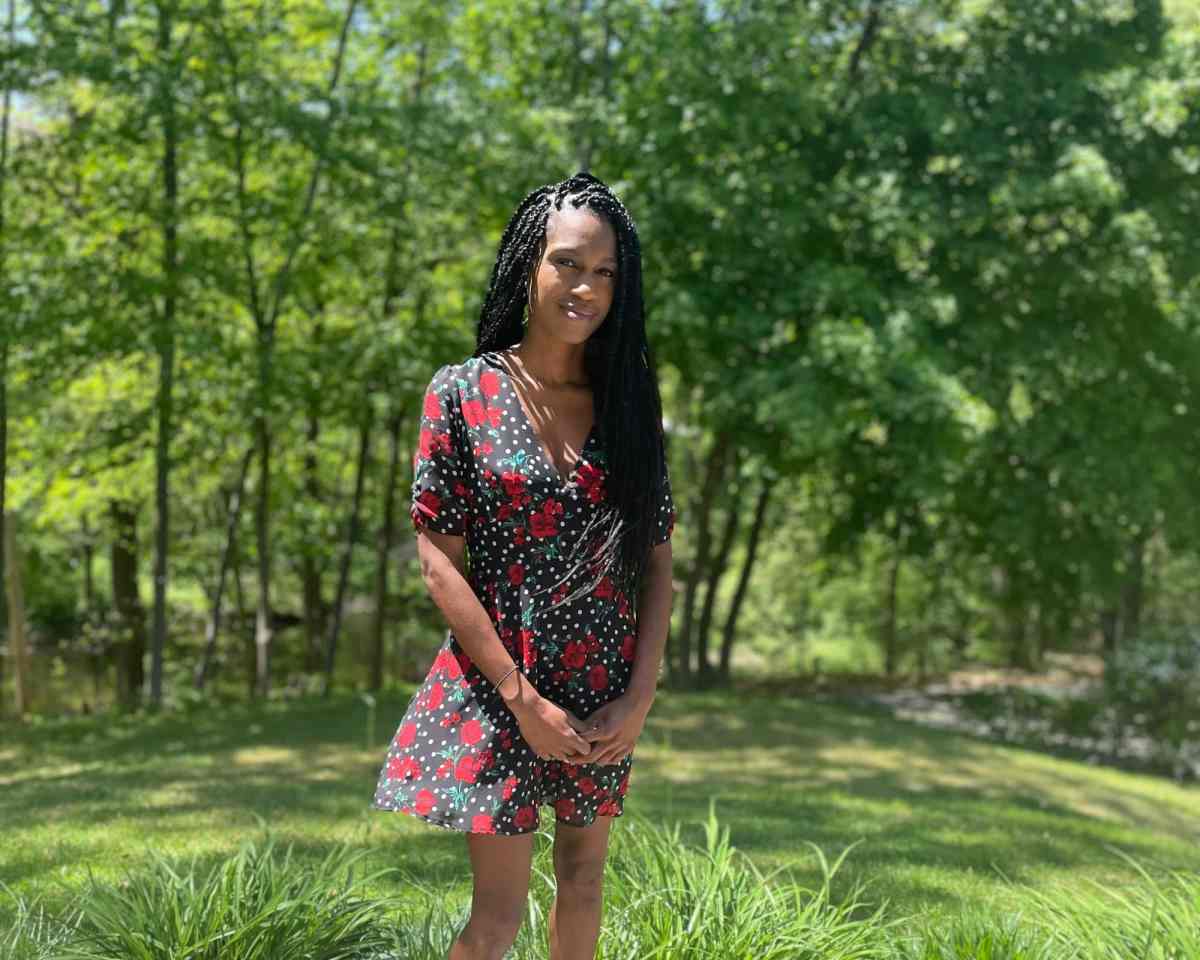INTERVIEWS BY LAEL HINES | All interviews done at the Christopher St. Pier.

Jamie feels the local police officers and Park Enforcement Patrol officers are prejudiced against the gay youth.
Domingo, a.K.A. D Love, Age 20
Where are you from?
Originally L.A., but I came to New York to pursue my career in dancing and modeling.
How long have you been coming here?
I have been coming here since I was about 15. So I’ve been coming here for five years.
Why do you enjoy coming here?
This is a place where you can free your spirit. You can express yourself in any way you want. Me, I do a lot of dancing. Here I’m able to express my moves and make up my own dances if I want.
On a daily basis, what kinds of things do you do here?
We dance a ton. We are incorrectly perceived as a very loud people; we just love to have fun. You may see us voguing or runway walking, or even just sitting down and socializing.
Why do you like to come here specifically?
For me, it’s a very fun environment. I come here to practice dancing, or simply to come and hang out with my friends. I can have a good time here no matter what.
Would you consider this your community?
Yes, this is where we come. We are free to be ourselves and talk about what we want to talk about. This is what we consider a “gay outreach.” This is an area where we as a people feel safer.
Do you ever find friction with local residents, perhaps diminishing this feeling of safety?
No, the local people are very friendly. Only the cops give us trouble. Sometimes they stop you on the street for no reason. They claim that they got a call when they really didn’t. They just want to mess with you. We know that they don’t really want us here, that’s why they turned out the lights on the pier.
How was it when the park didn’t have lights?
It was very depressing. Honestly, they would barely allow anyone on the pier. We would be forced to leave between 5:30 and 6. We put in a complaint because this is our community, this is where we hang out, this is where we chill. Every once and a while we have cookouts and parties. When the lights went out we couldn’t have them anymore. It crushed us.
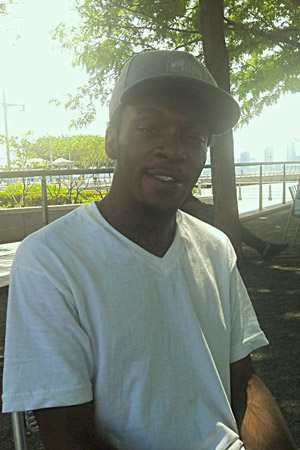
Chuck Taylor said he found incredible support in the Christopher St. community.
Chuck Taylor, early 30s
Where are you from?
Los Angeles, California.
How long have you been coming here?
Since 2009. I was in my late twenties when I started coming.
How did you learn about Christopher Street?
Everyone knows about Christopher Street. It’s famous. It’s more infamous than Castro in San Francisco. Go to Atlanta, go to San Francisco, go to Texas — everyone knows about Christopher Street in New York City.
Do you have any stories you wish to share?
There are so many to tell. I’ll just tell you about my first night here. I slept in front of Crunch, the gym. It’s right up there. I didn’t know where to go. I stopped a few other gay people and asked where they have a gay shelter. They told me to go to a shelter called Silvia’s Place. That first night I slept at Crunch. The next morning I came here to the pier and met a couple people. They told me they would take me to Silvia’s that night.
That day we all hung out around here. One person had, let’s say, prostituted and made some money to buy us all some pizza. That night my new friends took me to Silvia’s. Outside of the shelter there was a medical van where they did H.I.V. testing. That night I found out I was H.I.V. positive. Yet I still slept at that shelter on the floor. You would think it would be bad sleeping in a shelter but it was a safe shelter. It was a good place. I was comforted by the fact I was surrounded by other gay people, people I could relate to.
I’ve lived in Los Angeles, Atlanta and Las Vegas and I have never seen anything like what we have here in New York. We are lucky to have these safe havens. When I came here, I found people who wanted to save my life, who wanted to better my situation. Coming from Los Angeles, I was shunned from my family for being who I am. When I got here it was like an arm was put around me. I still feel bad, I still feel lonely, but these people took me to the shelter that day and they helped me get through everything, even the diagnosis. We laugh, we cry, we hang out, we just support each other every day.
Something I want the people to know is that we are all people, and no matter what situation we may be in, whether it be deemed natural or unnatural, we as Americans should look at each other as brothers and sisters, not white or black, gay or straight. We should find a way to all support each other like I’ve been supported here. I think it would make us a better society.
Do you ever experience any friction with local residents?
Yes. For years and years we sat over there, but then they opened a restaurant so they forced us to move over here. They sporadically force us to move. We also get a lot of trouble from cops. The other day I got charged for an open container when I had apple juice and I was standing next to someone with liquor. I wasn’t drinking alcohol, I don’t even drink alcohol. I even offered to be breathalyzed but he wouldn’t hear it. He just gave me a ticket. I never got arrested or had any trouble with the cops until I started sitting right here.
Do other people come and congregate here with you?
Yeah, on the weekend a lot of gay, lesbian and transgender people come from all over and just congregate here. But there are a couple people like me who stay here all the time. Some of them even sleep here, I don’t though.
Do you consider this area a safe place for you?
Yes, for me it is. I found a group of people who I consider my family. There are prejudices, but I’ve never experienced a hate crime against us. I’ve heard stories though. I heard that a week ago a gay guy got stabbed in the stomach and died in front of a bookstore. It makes me feel uneasy, but I continue to say hi to the locals or to the cops who may hold prejudices against me. I won’t change who I am. It will just take time.
Jamie, age 22
Where are you from?
I’m from Miami. I came here after six years in prison, but I’m the only one left in my family. I can’t really go home. Home is outside or anywhere I can lay my head. I’ve been coming here for two years now.
Why did you start coming here to Christopher Street?
I don’t know, here I felt freer. I felt more comfortable.
Do you consider this area a safe place for you?
This place is a safe haven. It’s an escape for people who were not accepted by their families. We come together and make new families; someone may be your grandfather, your brother or your mom. Most of the time we have fun. It’s like a hippie reservation.
Here in New York everyone can come together. Other people make it unsafe. I’m gay but I carry myself as a straight man. I’m not a feminine gay male. The cops look at me and think, “He’s selling drugs or something.” The cops judge the way we live our life.
Whatever the case may be, we’re not here to harm anybody physically, emotionally or mentally. People come here to share their stories, to have a party. We’re not harming each other. Whatever we do is up to us.
The cops make it their business to come harass us. The other day I got beat up on Sixth Avenue by a bunch of cops. They split my chin open, I got a neck fracture and a chipped tooth. This was all because I got in a fight with some guy who was talking to me the way he shouldn’t be talking to me; he was a straight male and he called me a faggot. I got offended, but I looked like the aggressor even though it was more him than me. Luckily, I know how to carry my own, because all gay people understand the society we live in. If we accidentally slip up, no one can accept that, because they brand us as a man who likes other men. They believe that a man should only like women. They’re prejudiced against us. If civilians were to walk by smoking weed, the police immediately accuse us of doing it, even if we didn’t.
Have you ever had any problems with locals?
That area used to be seating area. Since the restaurant opened we aren’t allowed to sit there. They keep telling us we have to buy something. They didn’t want us sitting there, so they pushed us out. They don’t want us to be seen in the open, they want us to be under the radar. The other day they called the cops on us, they said one of us stole a beer. I swear it was a homeless man who stole a beer. They called the cops on us and said, “We don’t want them over here. All they do is destroy things.”
Here’s the thing, they look at us as a “they.” Who’s “they”? To them we aren’t individuals, we’re just a “they.” Really, it’s the cops who give us trouble. I could write my own book of stories. I wish the general public would understand that we’re human too. Maybe they wouldn’t hate us so much if they actually got to know us, or heard our stories.
How was it when the lights weren’t working on the pier?
It was horrible. We couldn’t come to the pier. They kept it closed for a long time, claiming that it was broken, flooded or something. They opened up the pier all of the sudden when we weren’t the only ones asking about it, when people said they wanted to jog here or bring their kids here.



